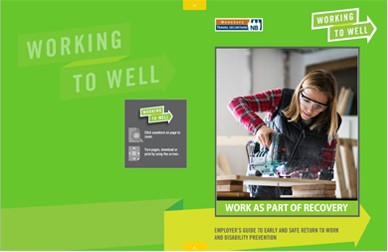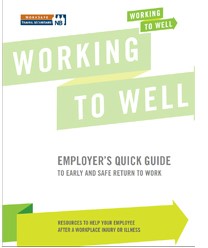


Work is good. This basic fact drives our efforts to support safe and timely return to work of injured workers. Returning to work helps workers stay active and renews a sense of purpose. It also provides financial stability. Working is good for physical and mental health, and, in fact, it often helps speed healing. Employers also benefit from return-to-work (RTW) programs as they keep productivity loss to a minimum, keep a skilled and experienced worker, reduce the costs of recruiting new talent and reduce claim costs that, in turn, can reduce assessment premiums. Making safe and sustainable work arrangements for recovering workers takes teamwork. Workers, employers, and health care providers all have important contributions to make to shift the focus from what a person can’t do to what they can do at the workplace.
For employers, the new “duty to accommodate” obligations under the Workers’ Compensation Act mean you must:
This new legislation applies to all employers in the province under the Workers’ Compensation Act, regardless of size, industry or injury risk profile.
For workers, the new “duty to accommodate” obligations under the Workers’ Compensation Act means you must:
Suitable work is work that an injured worker is capable of doing, considering the worker’s functional abilities and employment qualifications, and is safe (does not endanger their health and wellness).
Suitable work should also be flexible (can adapt to the worker’s recovery) and meaningful (contributes to the organization). If you are unsure or need help, please don’t hesitate to contact us for further guidance.
We believe that the large majority of employers are able to accommodate an injured worker in some capacity and comply with the legislation without experiencing undue hardship.
In some circumstances an employer may be able to accommodate an injured worker by offering modified duties on a full-time basis. In other situations, an employer may only be able to offer as little as one or two hours per week of modified duties. Even a small amount of regular contact with the workplace promotes good mental health and helps the injured worker achieve a better recovery.
Undue hardship must be evaluated on a case by case basis and factors considered when determining undue hardship include health and safety, organization size, costs, impact on employees and occupation.
WorkSafeNB’s primary focus is on education, building awareness, and ensuring workers and employers understand the legislation. We are committed to working with all parties throughout this process and answering questions to ensure clarity.
When non-compliance does occur, the Workers’ Compensation Act allows for penalties to be provided. For employers, this can be an amount up to a worker’s salary and for injured workers this could mean a reduction or suspension in their WorkSafeNB benefits. Any penalties collected would go to WorkSafeNB’s Accident Fund.
This addition to the Workers’ Compensation Act reinforces the importance of early and safe return to work in our province. By embedding the wording into the Act, it provides WorkSafeNB with the opportunity to partner with workplaces to develop a culture where stay-at-work and early and safe return to work is part of treatment. It helps us build a province where recovery while at work is supported and encouraged by everyone – employees, health care providers and employers.
Working together with this new legislation, we would move New Brunswick from having one of the longest lost-time accident duration results in the country to a more reasonable level. This means healthier, happier and more productive workers, and a stronger, prosperous, and more robust employment community.
 Working to Well interactive guide for employers (including managers and supervisors)
Working to Well interactive guide for employers (including managers and supervisors)
 Working to Well employer's quick guide to early and safe return to work (for immediate support)
Working to Well employer's quick guide to early and safe return to work (for immediate support)